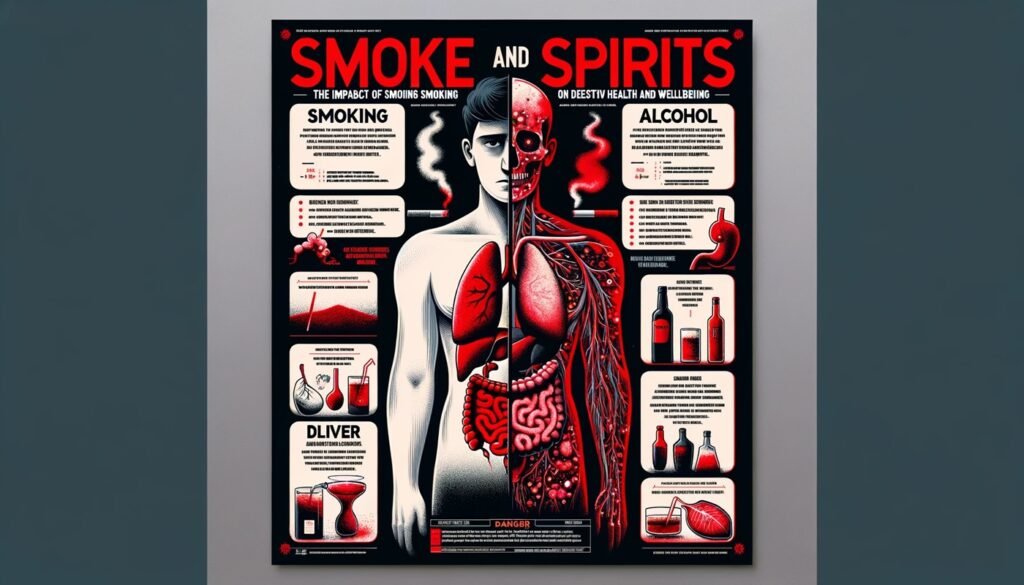
While the risks of smoking and excessive alcohol consumption are well-known to impact lung and liver health, their effects on the digestive system are often less highlighted but equally significant. This article explores how smoking and alcohol can detrimentally affect digestive health and overall wellbeing, offering insights into why reducing or eliminating these habits can lead to significant health improvements.
Contents
The Digestive Dangers of Smoking
- Increased Risk of Gastrointestinal Diseases
- Details: Smoking is strongly linked to the development of gastrointestinal diseases, including gastroesophageal reflux disease (GERD), peptic ulcers, and Crohn’s disease. It impairs the mechanism that controls the lower esophageal sphincter, allowing stomach acids to enter the esophagus, which can lead to severe heartburn and acid reflux.
- Impact on Liver Function
- Details: Smoking can exacerbate liver diseases, particularly in those already suffering from conditions like hepatitis. It increases the risk of liver cancer and can worsen the liver’s ability to process medications and toxins.
- Complications in the Pancreas
- Details: Smokers have a significantly higher risk of developing pancreatic cancer compared to non-smokers. Smoking also contributes to the development of chronic pancreatitis, a condition that severely affects digestive functions.
The Digestive Dangers of Alcohol
- Alcohol and Liver Disease
- Details: Alcohol consumption is a primary cause of liver disease, including fatty liver, alcoholic hepatitis, fibrosis, and cirrhosis. Alcohol damages liver cells, leading to inflammation and scarring that impairs liver function over time.
- Effects on Stomach and Pancreas
- Details: Alcohol can cause gastritis and pancreatitis, both acute and chronic. It stimulates stomach acid production, which can lead to stomach ulcers, and disrupts pancreatic functions, which can result in severe abdominal pain and digestive disturbances.
- Malabsorption Issues
- Details: Chronic alcohol consumption can lead to deficiencies in vital nutrients because it interferes with the digestive tract’s ability to absorb vitamins and minerals, impacting overall health and leading to further complications like anemia.
Strategies for Reducing Harm
- Quit Smoking Programs: Engage in support groups, nicotine replacement therapy, or consultations with health professionals to find the best strategy to quit smoking.
- Alcohol Moderation or Abstinence: Reduce alcohol intake gradually, seek professional help for dependency issues, and consider participating in support groups like Alcoholics Anonymous (AA).
Conclusion
The impact of smoking and alcohol on digestive health is profound and multifaceted. Reducing or quitting these habits can significantly improve your digestive health, reduce the risk of severe gastrointestinal diseases, and enhance your overall quality of life.
FAQs about Smoking, Alcohol, and Digestive Health
Q: How quickly can my health improve after quitting smoking or reducing alcohol intake?
A: Improvements can begin almost immediately. Digestive discomfort may lessen, and the risk of diseases can decrease as soon as you reduce your intake or quit.
Q: Are the effects of smoking and alcohol on the digestive system reversible?
A: Some effects can be reversible with early intervention. For example, fatty liver disease caused by alcohol can often be reversed with complete abstinence.
Q: Can moderate alcohol consumption still affect my digestive health?
A: Even moderate alcohol consumption can lead to minor digestive issues, although the effects are less severe compared to heavy drinking.
Q: What are some signs that smoking or alcohol is affecting my digestive health?
A: Symptoms may include persistent heartburn, stomach pain, bloating, changes in bowel habits, or unexplained weight loss. If you experience these symptoms, it is advisable to consult a healthcare provider.